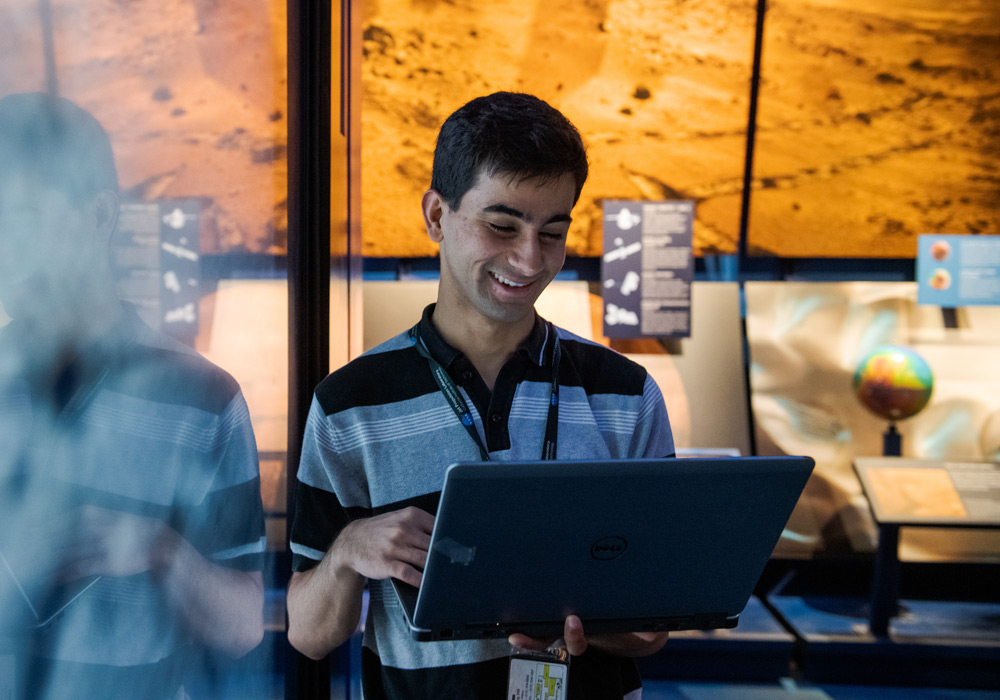Online Biological Data Science Graduate Certificate
This graduate certificate equips you with the quantitative and computational skills to analyze large datasets effectively. Through coursework, you’ll gain proficiency in programming with Python and R, writing Linux shell scripts for high-performance computing, understanding database technologies and constructing scientific and statistical hypotheses. You’ll also fine-tune your data analysis capabilities and explore their application across diverse research domains, such as business, economics, health and manufacturing.
Upon completion, you’ll be prepared for careers requiring expertise in analytical reasoning, database design and computer programming. Notably, employment of data scientists is projected to grow by 36% from 2023 to 2033, according to the U.S. Bureau of Labor Statistics.
Earn a master’s degree through stackable certificates
This graduate certificate can stand alone or serve as a main certificate toward a Master of Advanced Study. To complete the degree, you’ll stack a second 15-credit graduate certificate. This opportunity allows you to design a program tailored to your career goals and interests.
When admitted, connect with your academic advisor about stackable MAS options.
Who’s a good candidate for this certificate program?
This program is ideal for life scientists seeking to enhance their understanding of data science and for data scientists looking to deepen their knowledge of the life sciences. It’s designed to accommodate working professionals and students with a bachelor’s degree who are eager to work at the intersection of biology, math, statistics and computing.
Courses in this certificate offer the opportunity to deepen expertise in both data science and the life sciences, complementing a wide range of degree programs, including:
- Bachelor of Arts in physics
- Bachelor of Arts in psychology
- Bachelor of Science in biochemistry
- Bachelor of Science in biological sciences
- Bachelor of Science in forensic science
- Bachelor of Science in justice studies
- Bachelor of Science in neuroscience
- Bachelor of Science in sustainability
This program also provides insights for regulatory science, biomedical diagnostics, global health and forensic psychology. If you're ready to engage deeply with this material and expand your skill set, this program offers an accessible path to advanced knowledge in biological data science.

Arizona State University’s biological data science graduate certificate online integrates biology with advanced quantitative methods, preparing you to work at the intersection of life sciences, math, statistics and computing. You’ll develop the skills to analyze biological data and learn to apply these skills in a wide range of fields, including bioinformatics, environmental consulting and research data analysis.
This certificate includes the quantitative and computational courses required for the Master of Science in biological data science program. You’ll gain hands-on experience with programming in Python and R, data analysis and database technologies, all of which are essential for success in biological data science. These courses will deepen your understanding of data science and provide you with the practical tools needed to apply these skills in life sciences and related fields.
Prepare for the full New College experience curated by world-renowned faculty who are some of the brightest, most innovative academic minds in the world. Areas of expertise include psychology, anthropology, geography, political science, cybersecurity, forensic science and more. Our faculty strives to create an environment that prepares students to take their place in the world using the skills they’ve learned to pursue careers that benefit their communities.
ASU is a global university recognized for its commitment to innovation, research and high-quality academic programs. Our university is repeatedly awarded peer-reviewed honors from U.S. News & World Report and other respected organizations.
in the U.S. for innovation for 11 consecutive years, ahead of Stanford and MIT.
best online bachelor’s programs.
best global universities.
of graduates reported that their experiences at ASU inspired them to explore new career opportunities.
Biological data science graduate certificate applicants must fulfill the requirements of both the Graduate College and the New College of Interdisciplinary Arts and Sciences.
Applicants are eligible to apply to the program if they’ve earned a bachelor's or master's degree in a related field from a regionally accredited institution.
Applicants must have a minimum cumulative GPA of 3.00 (scale is 4.00="A") in the last 60 hours of their first bachelor's degree program or a minimum cumulative GPA of 3.00 (scale is 4.00="A") in an applicable master's degree program.
The admissions committee reviews applications holistically and may consider applicants with a GPA below 3.00 if they’ve demonstrated a strong past performance in related science coursework.
All applicants must submit:
- Graduate admission application and application fee.
- Official transcripts.
- Statement of purpose*.
*The statement of purpose should address the following in 250 words or less:
- Applicants should describe their career goals and how a graduate certificate in biological data science will help them achieve them.
- Biological data science is a discipline that spans a broad range of biological topics from molecular biology to ecology and uses a variety of computational methods. Applicants are asked to briefly describe two aspects of biological data science that most interest them and explain why.
- Optional: Applicants are asked to explain any extenuating circumstances that affected their undergraduate performance or that affect them now. This is not necessary if the applicant feels their application meets all the program's admission requirements.
An applicant whose native language is not English (regardless of current residency) must provide proof of English proficiency.
No, Arizona State University’s certificates and diplomas don’t specify whether you earn them online or in person. All certificates, diplomas and transcripts simply say “Arizona State University.”
























